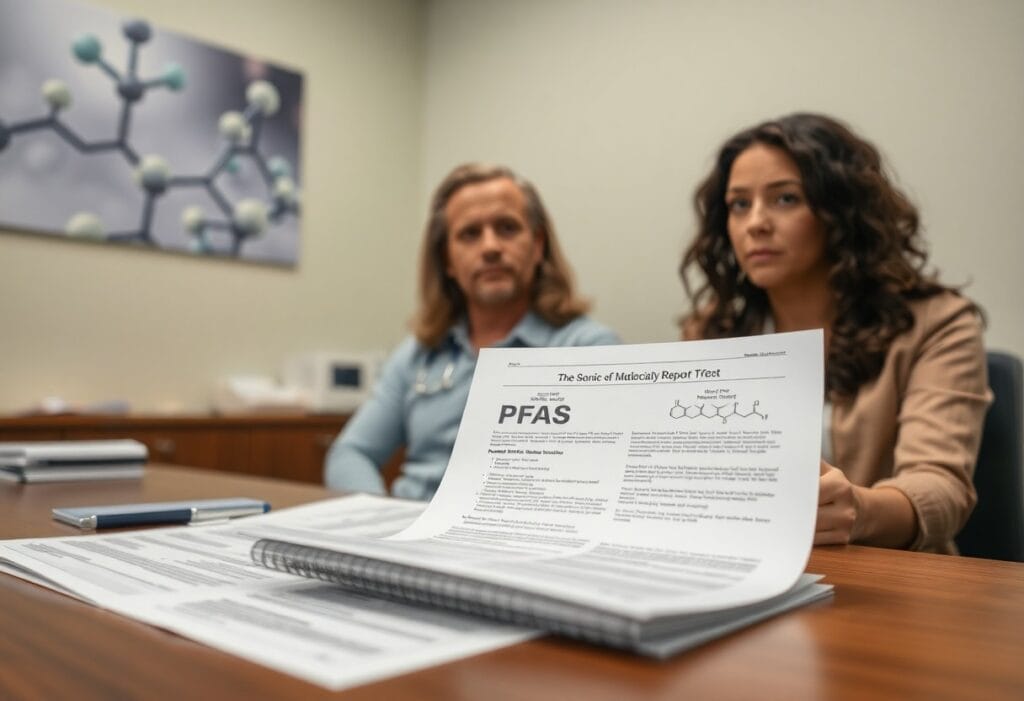Lawsuit options may be available for individuals affected by PFAS chemicals linked to rising infertility rates. If you or your partner have struggled with infertility issues and suspect exposure to these hazardous substances, understanding your legal rights is vital. PFAS, which have been commonly used in various products, can have detrimental effects on reproductive health. This blog post will guide you through the implications of PFAS exposure, how it relates to infertility, and the potential steps you can take to seek justice and compensation.
Understanding PFAS
As you research into the topic of PFAS, or per- and polyfluoroalkyl substances, it becomes clear that these are a group of human-made chemicals used in various industries for their water- and grease-resistant properties. Found in everyday products such as non-stick cookware, water-repellent clothing, and firefighting foam, PFAS have gained attention due to their persistence in the environment and potential health impacts on you and your family.
What are PFAS?
Among the various synthetic compounds, PFAS stands out for its routine use in various consumer products and industrial applications, resulting in widespread environmental contamination. These substances are often referred to as “forever chemicals” because they do not break down easily in nature, leading to accumulation over time.
Health Risks Associated with PFAS
On the health front, the association between PFAS exposure and numerous serious health issues cannot be overlooked. Research indicates that these chemicals may be linked to reproductive challenges, including issues with infertility and pregnancy complications.
As you explore the health implications, it’s alarming to note that exposure to PFAS has been associated with a range of health problems, such as hormonal disruption and immune system impairment. Studies have suggested that PFAS can interfere with fertility, potentially affecting both male and female reproductive health. Additionally, long-term exposure may lead to increased risks of certain cancers and chronic conditions. It is imperative to understand how these chemicals can impact your overall health and well-being.
PFAS and Reproductive Health
While emerging research indicates that PFAS exposure may have significant implications for reproductive health, the extent of these effects is still being studied. Many studies suggest that these chemicals, often found in household products and contaminated water sources, can disrupt hormonal balance and weaken fertility in both men and women. This raises important questions about how these substances could impact your ability to conceive and the overall reproductive outcomes.
Evidence Linking PFAS to Infertility
By examining various scientific studies and health surveys, researchers have discovered a troubling connection between PFAS exposure and decreased fertility rates. Instances of longer time-to-pregnancy and reduced fecundity have been observed in affected populations, underscoring the need for further investigation into how these chemicals impact reproductive health.
Mechanisms of Action
With ongoing research, scientists are beginning to elucidate the mechanisms by which PFAS can impair reproductive functions. Some studies suggest that PFAS disrupt endocrine pathways, leading to hormonal imbalances that can affect ovulation and sperm production. These disruptions can contribute to issues such as anovulation, reduced sperm motility, and altered ovarian function, making it significantly more difficult for you to conceive.
Indeed, the underlying mechanisms by which PFAS influence reproductive health are complex and varied. They involve interference with steroid hormone synthesis and receptor signaling, which are vital for normal reproductive functions. The accumulation of PFAS in your body may also lead to alterations in metabolism and inflammation, creating an environment that is less conducive to conception. As research continues to unveil these intricate relationships, it becomes increasingly important for you to be aware of the potential risks posed by these widespread environmental pollutants.
Legal Considerations
There’s a complex legal landscape surrounding PFAS and infertility claims. Many victims are exploring their rights to seek compensation for health impacts caused by these chemicals. It’s necessary to consult with a knowledgeable attorney who can navigate the specific laws applicable to your situation and help you determine if you have a viable case against responsible parties.
Grounds for a Lawsuit
Around the country, lawsuits related to PFAS are often based on negligence, strict liability, and product liability. If it can be proven that a manufacturer failed to warn consumers about the dangers of their products containing PFAS, or if those chemicals caused harm due to improper disposal practices, you may have grounds for a lawsuit.
Notable Legal Cases Involving PFAS
For those affected by PFAS, notable legal cases can shed light on potential outcomes. Various lawsuits have been filed against manufacturers for contaminating water sources and causing health issues amongst communities, including infertility.
Involving communities impacted by PFAS, several landmark cases have emerged, often resulting in significant settlements or judgments against corporations that knowingly released these harmful substances. Many plaintiffs have contracted serious health issues, including infertility, prompting courts to carefully examine evidence linking PFAS exposure to adverse reproductive outcomes. These cases not only highlight the potential for accountability but also underscore the importance of awareness and legal action for those affected. If you believe you have been harmed by PFAS, understanding these precedents can guide your next steps.

Steps to Take if Affected
Once again, if you suspect that PFAS exposure has impacted your fertility or overall health, it’s important to take proactive steps. Begin by gathering relevant medical records and documenting any symptoms or concerns. Next, reach out to local health authorities for information about PFAS contamination in your area. This information may assist in your understanding of potential exposure and its link to infertility.
Medical Consultation
With assistance from a healthcare professional, you can address your concerns about PFAS exposure and fertility. A medical consultation is necessary for evaluating your reproductive health, understanding potential risks, and determining the best course of action moving forward.
Legal Consultation
On the legal front, seeking advice from an attorney who specializes in environmental law or toxic torts is important. They can help you understand your rights regarding PFAS exposure and explore potential claims for damages, especially pertaining to infertility.
Take the time to consult with a qualified legal professional who can assist you in navigating the complexities of suing companies responsible for PFAS contamination. They will evaluate your situation and the legal recourse available, which may include seeking compensation for health issues tied to exposure. Your attorney will also help gather necessary evidence, such as past health records and proof of contamination, ensuring that you are prepared for potential legal challenges ahead.
Prevention and Regulation
To effectively tackle the issue of PFAS and its impact on infertility, it is necessary to prioritize prevention and enforce stringent regulations. These measures can significantly limit the release of these harmful substances into the environment, ultimately safeguarding your health and well-being.
Current Regulations on PFAS
For those concerned about PFAS exposure, it’s important to note that current regulations vary by state and country. While some regions have begun banning specific PFAS chemicals, a comprehensive federal standard remains elusive. Staying informed about local laws can help you navigate potential risks more effectively.
Ways to Reduce Exposure
Exposure to PFAS can be minimized through various practical steps in your daily life. You can achieve this by opting for PFAS-free products, using a water filter that specifically targets these substances, and avoiding fast food packaging known to contain PFAS.
But taking proactive measures to reduce PFAS exposure is necessary for your health. Choose PFAS-free alternatives for household products and avoid non-stick cookware that may release harmful chemicals. Invest in a quality water filtration system to ensure that your drinking water is free from contaminants. Additionally, be cautious when consuming takeout from food items that come in grease-resistant packaging. By implementing these practical strategies, you can effectively lower your risk of exposure and promote better reproductive health.
Resources and Support
Your journey toward understanding the effects of PFAS on fertility can feel overwhelming, but you are not alone. A variety of resources and support networks exist to help you navigate through this complex issue. From community organizations to legal advice, knowing where to turn for help is important for your well-being and future health.
Organizations and Support Groups
Beside legal considerations, connecting with organizations and support groups can provide you with valuable insights and emotional support. Many nonprofits focus on educating the public about PFAS and offer resources tailored to individuals facing infertility due to environmental factors. You might find community forums and local chapters that share your experiences and provide camaraderie.
Legal Resources for Affected Individuals
Below, you will find several legal resources designed to assist individuals affected by PFAS. These resources include law firms specializing in environmental cases, as well as information on litigation processes that could apply to your situation. Seeking legal advice can empower you to understand your rights and options for pursuing compensation.
Also, you should explore the potential of joining class-action lawsuits against manufacturers of PFAS. Many individuals have successfully sought damages for the health impacts associated with exposure. Legal advocates can help you determine if you qualify to file a claim, which may lead to necessary financial support for medical treatments and other expenses. Understanding your legal standing can provide both financial relief and a sense of empowerment during this challenging time.
Summing up
Upon reflecting on the potential link between PFAS and infertility, it’s important to understand that if you suspect exposure to these harmful chemicals has impacted your reproductive health, you may have legal options available to you. Research suggests a connection, and holding accountable the parties responsible for your exposure could lead to compensation and encourage further accountability in public health. As you navigate this complex issue, consider consulting with a legal professional specializing in environmental health to explore your rights and the possibility of a lawsuit.



















